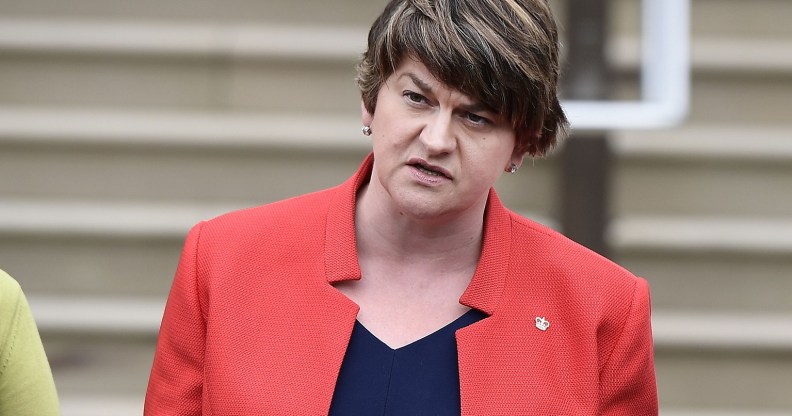70% support equal marriage in Northern Ireland, but First Minister still blocking reform

DUP leader Arlene Foster (Charles McQuillan/Getty)
Support for equal marriage has reached 70 percent in Northern Ireland, but First Minister Arlene Foster is still trying to block progress on the issue.
Northern Ireland is the last remaining place in the UK where same-sex marriage continues to be blocked, as the governing Democratic Unionist Party employs Petitions of Concern – a power designed to ensure cross-community power sharing – to veto marriage bills despite a Parliamentary majority in favour.
The DUP ran on a platform of ‘defending marriage’ in Assembly elections earlier this year, and First Minister Arlene Foster recently reaffirmed plans to continue employing powers to block any future marriage legislation, continuing a stalemate on the issue.
But polling has found that the DUP’s hardline stance on the issue is now significantly out of touch with the public.
65.22% percent of people support same-sex marriage, 28.26% insist the law should remain as it is, and 6.52% are undecided. With undecideds excluded, support for equality is nearing 70 percent, with a margin of support greater than two-to-one.
However, the poll found that there are still hold-outs among the DUP’s Unionist voter base, despite the rest of the Union passing equal marriage.
54% of Unionists are opposed to equal marriage with 37% in favour, while Republicans and Nationalists backed reform by a margin of 92% to just 4%. However, younger Unionists also favour reform by a significant margin.
Lucid Talk managing director Bill White told the Belfast Telegraph: “As we see a healthy majority of Northern Ireland would support same-sex marriage.
“However, with a majority of unionists still against, this indicates that in a full blown referendum situation – with the DUP electoral machine in full opposition mode – then the final result could much closer than our polling might suggest.”
Ms Foster recently defended her actions by insisting gay people don’t really want to get married anyway.
She said: “This suggestion that every single person who’s a homosexual wants to change the definition of marriage is actually wrong.
“I know plenty of people in that community who don’t want to see marriage redefined and are quite content to live in partnership… it’s all become a bit of a storm in a teacup.”

